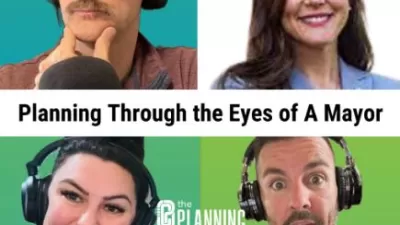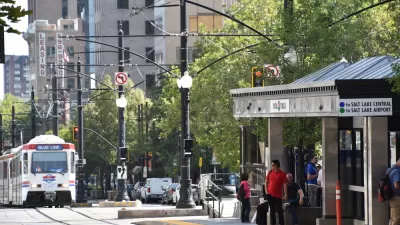The Utah Inland Port Authority has moved forward quickly with a plan to build a massive inland port complex, despite the objections of local officials in Salt Lake City.

Morgan Baskin reports on concerns surrounding plans for a massive "inland port" proposed in Utah:
The thousands of acres of muddy fields adjacent to Utah’s Great Salt Lake are still barren and quiet. But the site, formerly a landfill and long eyed by state lawmakers for development, has become a flashpoint for Utahns concerned about the future of their state’s economy.
The Utah Inland Port Authority will release a business plan for the 16,000-acre complex this spring, according to Baskin, so details are still scarce while the stakes are high. Baskin writes: "More than just a vision for the port, it’s a crack at urban planning that grapples with a key tension: How should states that boast distinct, fragile geographic features, like the Great Salt Lake, leverage them to keep building, and how far should legislatures go to protect them?"
Legislators voting to move the project forward have been accused of rushing the political process to start the project. Opponents, like then-Salt Lake City Mayor Jackie Biskupski, have called the state's approval of the project a "land grab."
FULL STORY: Questions surround Utah’s hastily passed inland port

Maui's Vacation Rental Debate Turns Ugly
Verbal attacks, misinformation campaigns and fistfights plague a high-stakes debate to convert thousands of vacation rentals into long-term housing.

Planetizen Federal Action Tracker
A weekly monitor of how Trump’s orders and actions are impacting planners and planning in America.

In Urban Planning, AI Prompting Could be the New Design Thinking
Creativity has long been key to great urban design. What if we see AI as our new creative partner?

How Trump's HUD Budget Proposal Would Harm Homelessness Response
Experts say the change to the HUD budget would make it more difficult to identify people who are homeless and connect them with services, and to prevent homelessness.

The Vast Potential of the Right-of-Way
One writer argues that the space between two building faces is the most important element of the built environment.

Florida Seniors Face Rising Homelessness Risk
High housing costs are pushing more seniors, many of them on a fixed income, into homelessness.
Urban Design for Planners 1: Software Tools
This six-course series explores essential urban design concepts using open source software and equips planners with the tools they need to participate fully in the urban design process.
Planning for Universal Design
Learn the tools for implementing Universal Design in planning regulations.
Gallatin County Department of Planning & Community Development
Heyer Gruel & Associates PA
JM Goldson LLC
City of Camden Redevelopment Agency
City of Astoria
Transportation Research & Education Center (TREC) at Portland State University
Jefferson Parish Government
Camden Redevelopment Agency
City of Claremont





























